It’s easy to be judgmental when you’re young. It’s something of a rite of passage. You watch adults make mistakes and say: that’ll never be me. I will never cheat, I will never fuck up, I will never get divorced.
And then you grow up.
Much has been written about Gen Z’s intense moralizing. “The Puriteens ruined fandom” is a common refrain in fandom spaces, and we’re regularly subjected to discourse from someone discovering a piece of media that fails their personal purity test. We shouldn’t consume media with characters who are problematic (Will & Grace, Friends, Seinfeld, and Frasier have all been deemed unacceptable). They don’t want to see kink at pride, Rocky Horror is transphobic, and Amanda Dimoldenberg and Andrew Garfield aren’t allowed to date because of their age gap (11 years, for the record).
Last week on the internet, it became clear that the boundaries for acceptable behavior have shifted once more.
In one horrifying case, a woman who discovered her undocumented boyfriend was cheating on her and decided to punish him by… pretending to drive him to Disney Land and leaving him in Mexico instead. A guerilla deportation, as it were. Imperialist border violence aside (a sentence I never thought I would write) the reaction chilled me to my core: people cheered her on, declaring her a girlboss and a champion for taking matters into her own hands.
In another act of astonishing cruelty, a woman overheard a man berating his wife and mocking her art. The woman took to Twitter/X to join the husband in his mocking, doing enough research to find the art on Facebook Marketplace and opening the wife to further mockery and public scorn.
In another, a woman went viral after singing a ditty about moving from Los Angeles to Plano, Texas for her boyfriend of three years. She depleted her life savings ($7,000) and organized the cross country move only to be unceremoniously dumped via note once their new home was set up. I want it on the record that I agree this is sad, rude, and cowardly: surely there was a better time to end the relationship than immediately after the move. Yet the reaction was also surprising: outside of the usual dogpiling whenever a woman reveals something bad happened to her (you should have known better, you should have seen the signs, he obviously hated you) there was a rush to vilify the ex-boyfriend, claiming that she deserved financial restitution and that he should be punished for “wasting her time”.
This is where my hackles were raised. Punished for what, exactly? This is part of being in your twenties: you date horrible people, learn from it, and move on. This is an example of the type of thinking I talked about in Inputs and Outputs: for many people, the belief is that if you devote enough time to a relationship, you get a reward (marriage) which means you’re safe and protected from anything bad ever happening to you again. I kindly pointed out that this simply isn’t true. People get divorced every day. People die every day. There is literally no way of preventing someone from leaving you once they’ve decided they want to leave.
In The Age of Entitlement I talked about this as well, saying that some people online have decided that simply because they want to be in a relationship they deserve to be in one/stay in one. I also discussed the idea that all relationships end in either a wedding or a traumatic, devastating breakup where one person is the perfect, innocent victim and the other is an evil abuser for ending the relationship, another example of the black and white thinking that’s taken hold of Gen Z.
This is surely directly tied into the expansion of therapy speak to encompass minor inconveniences (someone being mean to you is abuse, someone lying to you is gaslighting, someone being nice to you and then deciding not to marry you is lovebombing) and the rise of an inability to be uncomfortable. Online, I’m constantly screaming that conflict is not abuse.
Bree H posted an excellent video on this a few days ago and talked about how the blurred definitions of terms with real meanings in clinical contexts removes urgency from people doing actual harm. If everything is gaslighting, nothing is.
We’re seeing this more and more: all interpersonal conflicts have risen to operatic heights, transformed into morality plays where there needs to be a hero and a villain, a victim and a perpetrator. I do think it’s all connected — the obsession with purity and punishment, the constant vigilance to keep oneself and others in line in an effort to maintain some imaginary social order. The problem therein is that all nuance is obliterated: there can be no shades of gray when everything is black and white.
In the last few years there’s been a rise of people referencing how the combination of our phones and social media have created a surveillance culture and transformed society into a permanent panopticon. In social psychology and policing, a panopticon is defined as a type of prison where a guard sits in the center observing inmates while unseen. This type of surveillance creates a permanent watchdog mindset and a culture of fear. The power of the panopticon comes from the displacement of regulation: when you never know if someone is watching, you behave as if someone is always watching, and in turn, regulation of the self becomes regulation of others.
Thinking back to two years ago, the West Elm Caleb situation encompasses every facet of this. A quick refresher: a number of dating influencers/semi-popular New York TikTokers deduced they were dating the same man and quickly created a social media firestorm that was covered in Rolling Stone and the New York Post. I maintain that someone not wanting to date you is not a crime. WEC wasn’t exclusive with any of the women, did not promise them fidelity, and did not cheat on any of them. He shared the same playlist with them, took them to the same spots, and hooked up with them in short succession. Was he a bad dater? Sure. But this is how people date in New York. You meet multiple people, date them, pick one you like, and lock in. Dating multiple girls isn’t a crime worth doxxing someone over. Yet on TikTok, people left comments saying he “was a detriment to women” and he “needed to be held accountable”.
(I’ve said it before, but you can really tell the lonely and the anxiously attached have won the internet when these things go viral. The memes about people “not looking for anything serious” and discourse around these situations reveal that many people truly believe that someone not wanting to be in a relationship with them is a sin.)
I don’t believe personal disputes should be litigated in the court of public opinion. I don’t want to defend men and bad actors, but this is a troubling trend: right now it is being used to name and shame men who have treated women badly in interpersonal situations, sure, but it surely won’t stop there. The belief that if you don’t do anything bad then someone simply won’t make a video about you is for the very young, and explicitly the logic of social control (the same argument has been used when it comes to internet privacy: if you have nothing to hide, why not allow companies to have access to all of your data?).
I’ve seen callout posts about friendship breakups and roommate disputes, and if you’re in queer spaces, you’ve been tormented by posts detailing polycule dissolutions and dish trauma/ emotional warfare. The details shift, but ultimately, we’re not discussing serious situations that require legal interference: I’m not referring to intimate partner violence, sexual assault, or any of the many instances of violence committed against women on a daily basis. I am on the record as someone who believes gossip is a social good, who supported the Shitty Media Men list and understands the nuances with which marginalized communities wield their limited options for justice in American hegemony. I am simply saying that by now, we know that posting details about intimate situations often leads to doxxing, and I will never believe that doxxing someone who ended a romantic relationship or a friendship will be justified. Again, not talking about police violence or Karens or racism or other situations where social media can be wielded as a weapon against bad actors: I am discussing the gray landscapes where we conduct our romantic and private lives.
The belief that everyone who has behaved badly in a romantic situation is a monster who deserves social ostracization for breaking up with people or not being honest with them is wild. The most gracious part of me understands the impulse to reveal, to declare: look at what has been done to me. Look at how I hurt. I’ve said it before: I think people post as a bid for community. Think of the chemical rush you get when someone states that your ex is trash. I cannot imagine how that would feel one millionfold, to have thousands of strangers clamoring to agree that you’ve been wronged. The novel In Universes makes this point as well: “Men were meant to admit to doing terrible things. Women were meant to confess the terrible things that had been done to them”.
I thought I made this point cogently on TikTok, but received a dozen comments from people saying that I supported men “doing whatever they wanted” and that I didn’t support women because I said doxxing your exes is bad. I’ve been on the internet forever: I’m very familiar with people using their identities as both shields and cudgels. Being a member of a marginalized group does not exempt you from criticism.
The more that I write about discourse and the internet, the more that I feel like I’m writing in circles, writing towards the same truth at the core of everything wrong with people online. It’s hard to make a few of these points without sounding like a conservative schoolmarm, but I write about them because I’m worried that the social fabric is fraying. Years ago it was inconceivable that people would publish full names and details about the people that hurt their feelings, and now it’s normal. It is easy to dismiss this behavior as that of the very young, the very online, or the very misanthropic, but behind the avatars and cartoon profile pics are very real people. They’re at our jobs, they’re at concerts, they’re refusing to speak to people at Kohl’s and coffee shops. The higher the number of people engaging in openly antisocial behavior, the more afraid I become.
I originally wanted to write about etiquette this week, but my thoughts there are connected to this. While misanthropy has always existed, the flattening of the internet allows these people to speak with authority, when normally they’d be shunned. Refusing to acknowledge the humanity of people around you, refusing to speak to your coworkers, refusing to drive your friends to the airport, keeping logs and ledgers of everything the people you claim to love owe you: none of these things are normal. They’ve become normalized because antisocial people get online and scream about how they don’t owe anyone anything, and then wonder why they don’t have friends or a community (a point I have been making since 2022!). These are not people who are fun or engaging, and I would never take this advice from anyone. Who is asking selfish, miserable people for their thoughts on how to behave in a society? Everyone, apparently.
Sociology is the study of societal forces at the macro level: it is easy to dismiss the behavior of the very few as a tiny blip. People did the same with incels and now everyone understands looksmaxxing while 14 year olds on TikTok are obsessing about the size of their pores and doing daily sheds to be young and beautiful forever.
I’ve been beating this drum for a year, but the American obsession with seeing oneself as a victim devoid of any agency is rotting us from the inside out. Self-infantilization is an American pastime and the framing of every slight as a great injustice cannot end well. Navigating dating as someone who casts every romantic disappointment as a tragedy, believing that everyone who hurts you deserves to be “punished” is no way to live. Religion and policing have shown us that apparatuses of punishment don’t prevent people from engaging in bad behavior. Ask a Catholic or a Southern Baptist about their experiences growing up doused in shame and a constant fear of punishment. Ask them how it transforms their thoughts and beliefs into shapes they no longer recognize.
Way back in 2014, Leslie Jamison wrote about the dangers of victimizing oneself through self-mythologizing in The Empathy Exams:
“These are the dangers of a wound: that the self will be subsumed by it (“personal vanishing point”) or unable to see outside its gravity (“everything led to it”). The wound can sculpt selfhood in a way that limits identity rather than expanding it—that obstructs vision (of other people’s suffering, say) rather than sharpening empathic acuity.
Many of us will make mistakes. Most of us will experience heartbreak or a friendship breakup or have a shitty roommate. The question becomes: who do you want watching when you inevitably stumble? A group chat of ten people? Your neighbors? Your exes and friends? Or do you want your texts and foibles broadcast into various algorithms, delivered to the eyes of millions of strangers eager for their next pound of flesh? The choice is ours. I pray we make the right one.
TtB Book Club: IRL meeting will either be on 11/12 or 11/14! Finalizing with the location this week.





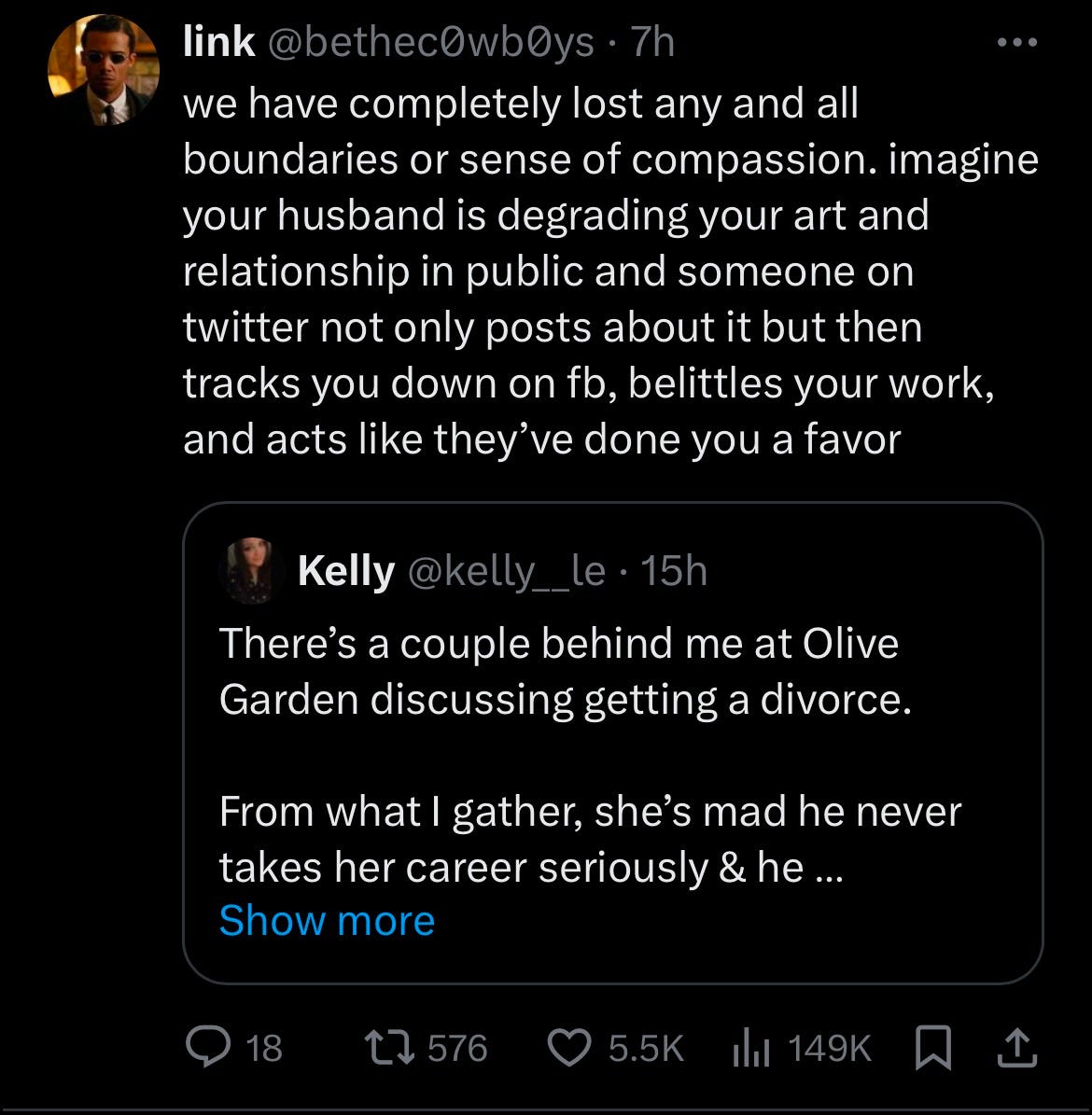

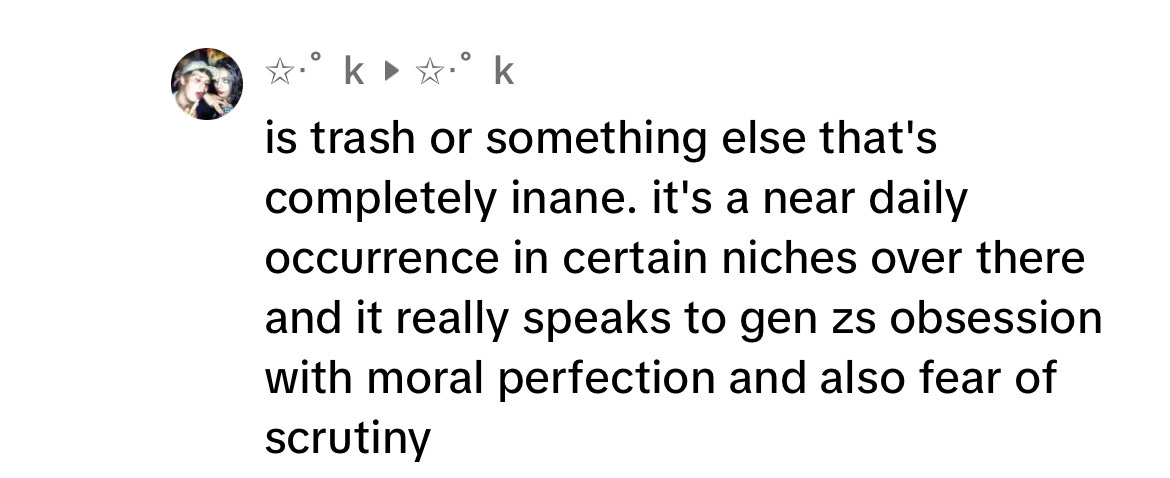

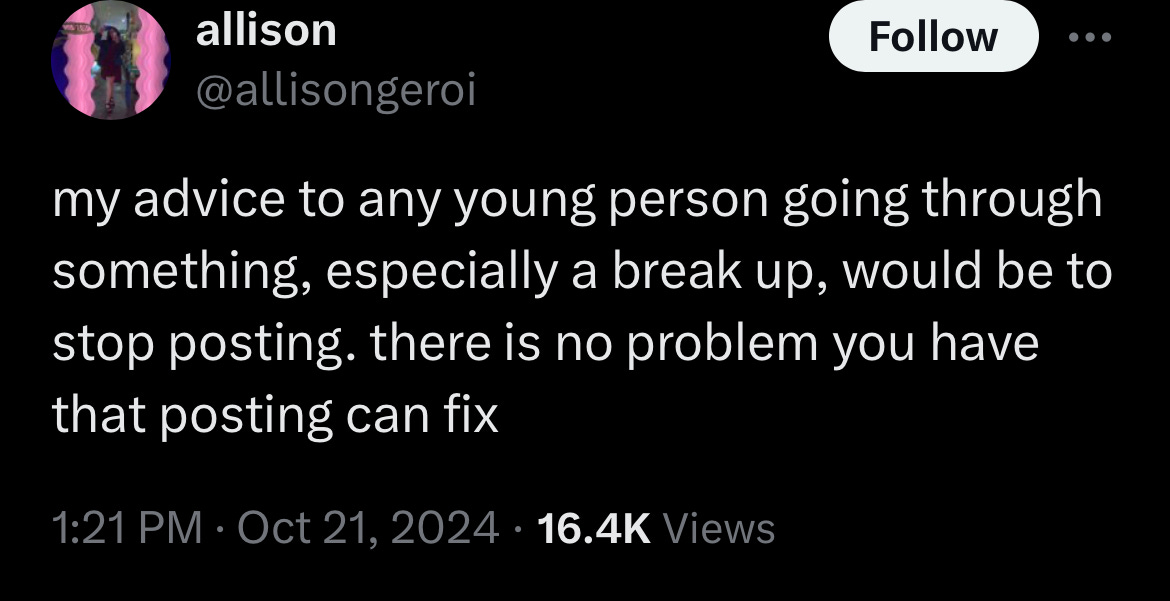
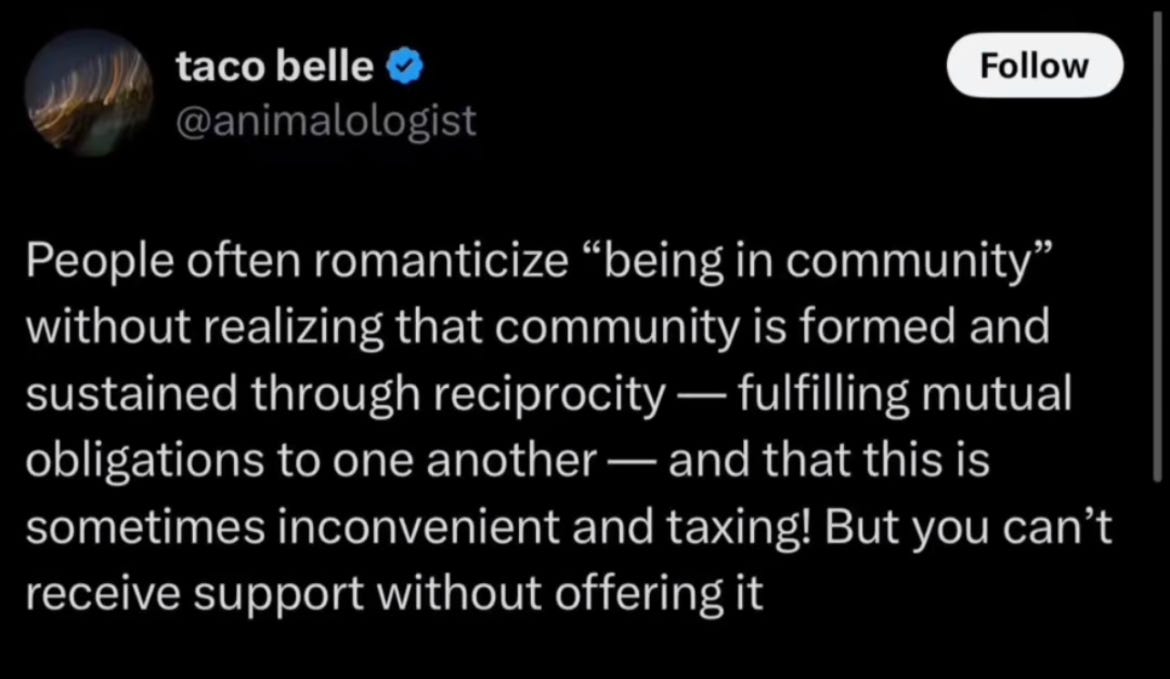

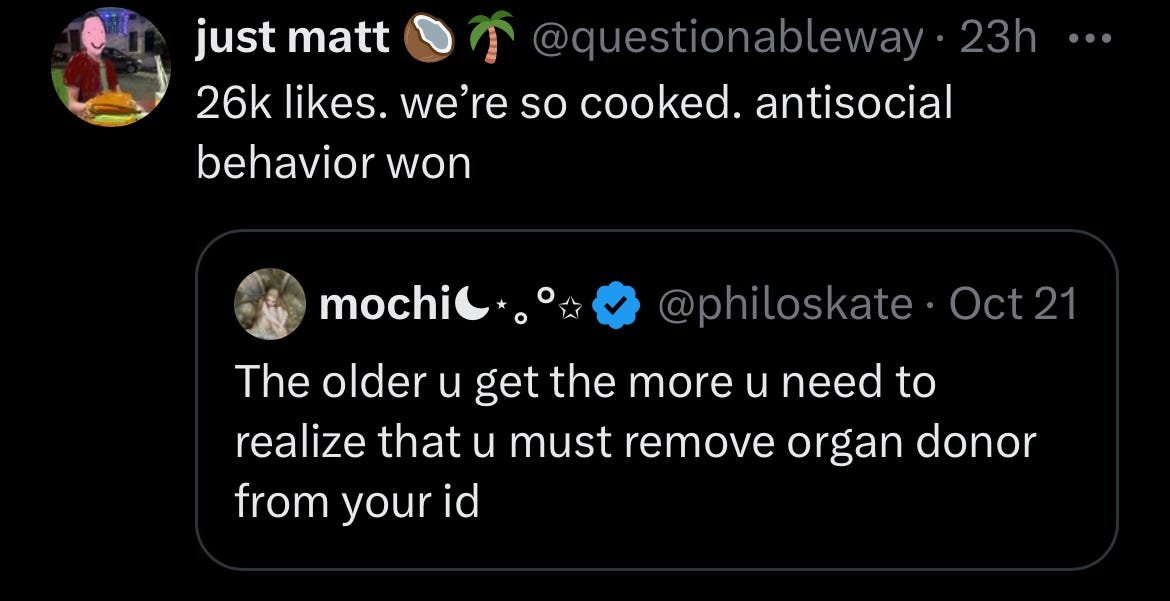
I fear we are developing a compulsive need to dehumanize others as an outlet for personal pain and it’s genuinely going to cost lives one day.
Do you think that there's also component of "everything everywhere is a space for all ages" phenomenon? Not in a "everything is being sanitized for kids" way but in a "adult and teens are now frequently exposed to the social behaviors of each other" kind of way. We know that kids/teens are inherently immature and now due to the internet being one of the few open social spaces they have these bouts of immaturity are on display for everyone to see. Not only that but I do think when you're in spaces where there are adults around there is this urge to seem "more mature" (sephora kids, booktokkers, fandom spaces etc) without really knowing what "being mature" means. Thus, this sort of "moral arbiter" archetype comes into play.
I could be way off base but the "puriteens are ruining everything" takes make me bristle slightly because it implies there are no adults in the room. I think teens have been like this forever, but instead of being able to hash things out in the hallways of school or in a gc with their friends it has now become spetical. Not only that but now there is an expectation to post.
Great write up. I'm going to be thinking about this all day.